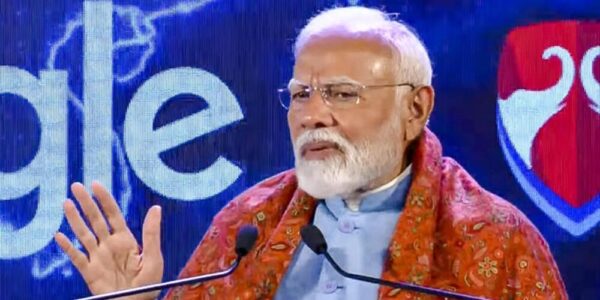Govt to set up deregulation commission to further reduce state’s role in governance: PM Modi
New Delhi, Feb 15 (PTI) Prime Minister Narendra Modi on Saturday said the government will constitute a deregulation commission to further reduce the role of the state in all spheres of governance.
Speaking at ET Now Global Business Summit, Modi said the government has ended hundreds of compliances and now through Jan Vishwas 2.0, more archaic compliances are being reduced to promote ease of doing business.
“It is my conviction that there should be less interference of the government in the society. For this, the government is also going to constitute a Regulation Commission,” he said.
* Click to Follow Voice of Ladakh on WhatsApp *
The NDA government through its policies have been able to replace ‘Fear of Business’ with ‘Ease of Doing Business’, he said.
Acknowledging that the role of the private sector is very important in the journey for Viksit Bharat, he said the government has opened many new sectors including nuclear energy, space, commercial mining and power distribution for investment and bring in efficiency.
He exuded confidence that India will be an active participant in the fourth industrial revolution and take a lead role in that.
Talking about various reforms, the Prime Minister said it has been made in property rights by launching Svamitva Yojana.
“Worldwide, many people do not have legal documentation for their properties. Property rights help reduce poverty, but the previous government never paid attention to this issue. This approach does not help build a nation. That’s why we launched the ‘Svamitva Yojana’. Thanks to ‘Svamitva’, properties worth Rs 100 lakh crore have been unlocked in rural areas,” he said.
Property worth Rs 100 lakh crore was already there in the villages, but it was not able to contribute to the country’s economic development, he said, adding with the property rights, villagers are now able to get bank loans.
“Today we hear that because of these cards, people are getting benefited…people in villages are getting credit access,” he said.
Sharing further details of the scheme, he said 3 lakh villages were surveyed with the help of drone and after the survey 2.25 lakh persons were given property cards.
Launched by the Prime Minister on National Panchayati Raj Day, April 24, 2020, the SVAMITVA Scheme aims to drive the economic transformation of rural India by providing property owners in village Abadi areas with a ‘Record of Rights.
Utilizing advanced drone and GIS technology for land demarcation, the scheme fosters property monetization, facilitates access to bank loans, minimizes property disputes, and promotes comprehensive village-level planning.
Prime Minister remarked that today’s politics has become performance-oriented and the people of India have clearly stated that only those connected to the ground and delivering results will sustain.
The government needs to be sensitive to the needs of the people, something that was lacking in the previous UPA regime.
“Our government focused on addressing the needs of the people, and as a result, 25 crore individuals have come out of poverty. We now have a Neo-middle class in the country.
To further support the middle class, our government has raised the threshold for zero Income Tax liability from Rs 7 lakh to Rs 12 lakh strengthening the entire middle class and boosting economic activity,” he said.
“These achievements are possible due to a proactive and sensitive government”, he said.
Talking about the banking sector, the Prime Minister said, it was in crisis a decade ago and millions of Indians were outside the banking system. “India was among the countries with the most challenging access to credit”, he said.
“Government’s strategy to strengthen the banking sector: Banking the unbanked, Securing the unsecured, and Funding the unfunded”, he said, adding financial inclusion has significantly improved, with nearly every village now having a bank branch or banking correspondent within a 5-kilometre radius.
He cited the example of the Mudra Yojana, which has provided around Rs 32 lakh crore to individuals who couldn’t obtain loans under the old banking system.
While the government is providing large numbers and amounts of loans, he said, the banks’ profits are also increasing.
He contrasted this with 10 years ago, when reports of record bank losses and editorials of newspapers expressing concern over NPAs were common now public sector banks have recorded a profit of over Rs 1.25 lakh crore in 9 months of the current financial year.
The Prime Minister emphasized that this isn’t just a change in headlines but a systemic change rooted in banking reforms, demonstrating the strengthening pillars of the economy.
Modi also criticised the previous UPA government saying that they were slow in undertaking reform measures. But after the BJP-led government came to power in 2014, “a new revolution of reforms started”.
“Congress speed of development and Congress speed of corruption, the country was watching…what would have happened if it had continued?” he wondered.
Due to reform measures in the last decade, he said, India became the fifth largest economy in the world and “I am saying this with full responsibility that India will become the third largest economy in the next few years.
Observing that even after independence, he said, remnants of the British era continued to be carried forward.
He cited an instance where phrases like ‘justice delayed is justice denied’ were heard for a long time, but no concrete steps were taken to address this issue.
On the implementation of Bharatiya Nyaya Sanhita (BNS), he said that in just 7-8 months, the changes are clearly visible now.



0 Comments